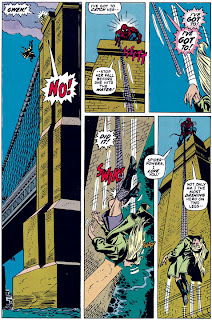When I was a kid, my first comic book and favorite hero was Spider-Man. I truly cared about the character, thinking Peter Parker was actually just as much a star of the book as Spider-Man himself. I actually started reading the comic a couple of years after the death of Peter's girlfriend, but thanks to Marvel's reprint Spidey title at the time, Marvel Tales Presents Spider-Man, I was able to read it for the first time.
This was the storyline that, for a while anyway, shaped Spider-Man's world. The woman he loved most in the world, and potentially the one he would have married if the storyline had been allowed to progress, was suddenly killed. And this was a serious death in the comic books, not an imaginary story or hoax that would later by wiped away as so many other comic book deaths had been.
Several things make this a pivotal moment in comics to me. First, well, she died. It was the woman he loved, killed by his arch-enemy...but not necessarily killed by his arch-enemy. Oh, Green Goblin had a part in it by knocking her off the bridge, but when you look at that fateful panel as Spidey is shooting his web to catch her you see that tiny "snap" just at her neck, indicating that Gwen was alive when she fell, and that Spider-Man himself had killed her while trying to save her. In other words, Spider-Man failed in the biggest way possible.
Yes, some might say that was a cold-hearted way to do it, but I think it was some powerful writing for the time. Her father had died saving a small child a few months prior and she blamed Spider-Man for that death, never knowing that it was Peter behind the mask. And now, just as Peter is reeling from his death, he loses his love.
Her death elevated her to the status of the perfect woman for Peter. And it shocked comic fans everywhere. The storyline finished up with the death of Green Goblin by being impaled with his glider (a fate that was used in the first Spider-Man film), and he stayed dead for years afterward.
After that, Harry Osborn, Norman's son and Peter's best friend, picked up the mask of Green Goblin and came after Spider-Man for what he did (again, a storyline borrowed for a Spider-Man film...the bad one). This even eventually led to the death of Harry Osborn many years later because he'd been poisoned by the formula used to make him the Green Goblin.
So in this one huge story arch that stretched for years, Peter Parker lost his girlfriend, his arch enemy, and his best friend...and began a relationship with Mary Jane Watson that led to one of the greatest comic book marriages ever. That truly was "amazing". It shaped Spider-Man's legacy for comic fans everywhere.
Then a man named Quesada stepped in and destroyed all of that for us.
In "Sins Past" he revealed Gwen Stacy--Peter's perfect girl--had actually had Norman Osborn's (the Green Goblin) kids. And those kids grew super-fast and tried to kill Spider-Man later. He brought Norman Osborn back, and then he wiped everything out for the previous 20 years and started all over again. Harry Osborn was back now, but Gwen was still dead. Mary Jane was not and never had been Peter Parker's wife (hey, if Quesada ain't gettin' any then neither is Spider-Man, right?). Quesada's fanboy dreams for the character were complete.
So there you have it, a moment I consider above-the-standard for the Bronze Age of comics (it may have actually snuck into the Silver Age, but again I read it as a reprint in Marvel Tales so it was Bronze to me). It was one storyline that truly did change a hero's life
As we start looking into these strong moments in Silver and Bronze Age comic book history, which ones do you think deserve mention? Which comic book moments stuck with you long after you read them?












1 comment:
I believe it was actually Bob Harras as EIC who brought Norman Osborn back as he thought he was the only villain capable of engineering the Clone Saga.
Post a Comment